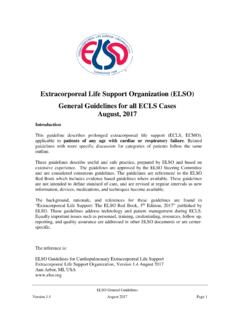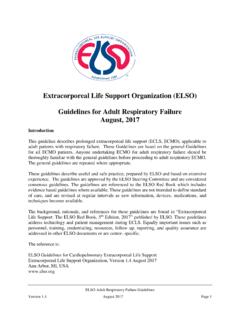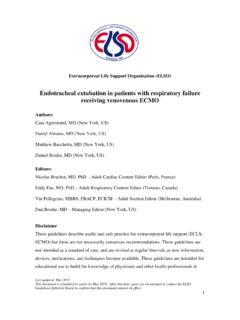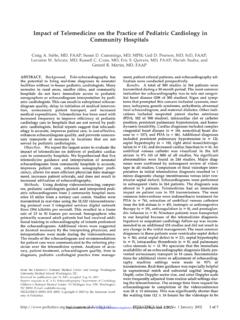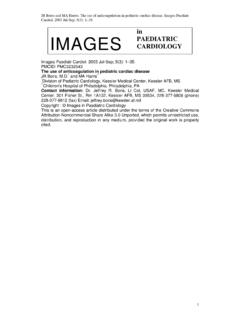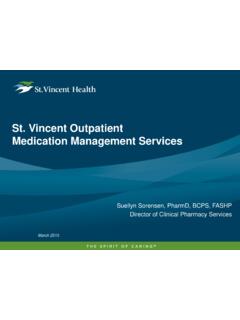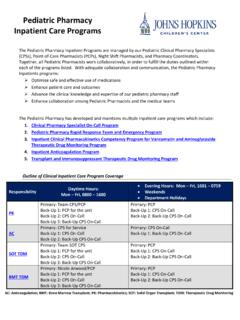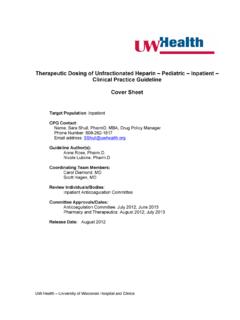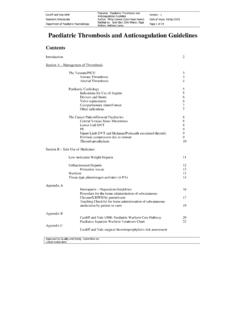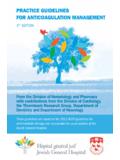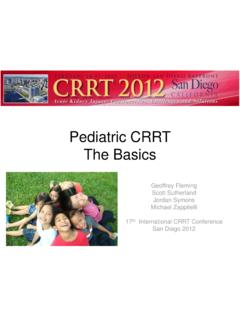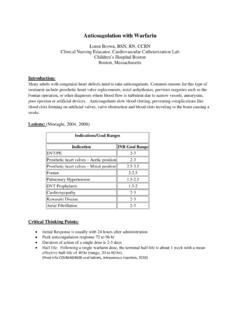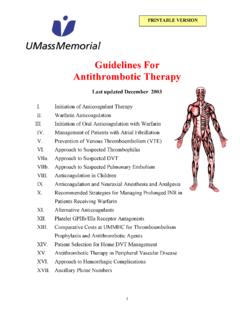Transcription of ELSO GUIDELINES FOR ECMO CENTERS PURPOSE …
1 ELSO GUIDELINES for ECMO CENTERS March 2014 Version Page 1 ELSO GUIDELINES FOR ECMO CENTERS PURPOSE These GUIDELINES developed by the Extracorporeal Life Support Organization, outline the ideal institutional requirements needed for effective use of extracorporeal membrane oxygenation (ECMO). The Extracorporeal Life Support Organization recognizes that differences in regional and institutional regulations especially concerning hospital policies may result in variations from these GUIDELINES . INFORMATION AND BACKGROUND Extracorporeal Membrane Oxygenation (ECMO) was first used successfully for neonates with respiratory failure in 1975.
2 Today it is an accepted treatment modality for neonatal, pediatric and adult patients with respiratory and/or cardiac failure failing to respond to conventional medical therapy. ECMO is defined as the use of a modified cardiopulmonary bypass circuit for temporary life support for patients with potentially reversible cardiac and/or respiratory failure. ECMO provides a mechanism for gas exchange as well as cardiac support thereby allowing for recovery from existing lung and/or cardiac disease. It has been estimated that approximately 2800 newborns could benefit could benefit from ECMO annually in the US (one of every 1309 live births).
3 pediatric and adult patients are being successfully treated in increasing numbers. ELSO GUIDELINES for ECMO CENTERS March 2014 Version Page 2 GENERAL A. ECMO CENTERS should be located in tertiary CENTERS with a tertiary level Neonatal Intensive Care Unit, pediatric Intensive Care Unit and/or Adult Intensive Care Unit B. ECMO CENTERS should be located in geographic areas that can support a minimum of 6 ECMO patients per center per year. The cost effectiveness of providing fewer than 6 cases per year combined with the loss, or lack of clinical expertise associated with treating fewer than this number of patients per year should be taken into account when developing a new program.
4 C. ECMO CENTERS should be actively involved in the Extracorporeal Life Support Organization (ELSO) including participation in the ELSO Registry. ORGANIZATION A. General Structure: The ECMO center should be located in a tertiary level intensive care unit with the following components. 1. A single physician ECMO program director with responsibility for the overall operation of the center . While there may be several associate directors with specific interests or focus in limited areas of ECMO care, the primary medical director should be responsible for assuring appropriate specialist training and performance, directing quality improvement meetings and projects, assuring proper and valid data submission to ELSO, and should also be responsible for the credentialing of other physicians who care for ECMO patients or who manage the ECMO circuit.
5 2. An ECMO coordinator with responsibility for the supervision and training of the technical staff, maintenance of equipment, and collection of patient data. 3. A multi-disciplinary ECMO Team should have quality assurance review procedures in place for annual ECMO evaluation internally. 4. Formal Policy and Procedures outlining the indications and contraindications for ECMO, clinical management of the ECMO patient, maintenance of equipment, termination of ECMO therapy, and follow-up of the ECMO patient should be available for review. 5. Appropriate laboratory space for training and continuing medical education should be available.
6 ELSO GUIDELINES for ECMO CENTERS March 2014 Version Page 3 B. Staffing Issues: 1. The ECMO physician staff should meet the requirements of their subspecialty training as set forth by their specific governing board (American Board of Surgery, American Board of Pediatrics, etc.). In addition, ECMO staff should meet the training requirements described below. 2. The medical director should be a board certified neonatologist, a board certified critical-care specialist, or a board certified pediatric , cardiovascular, thoracic surgeon, trauma surgeon, or other board certified specialist with specific training and experience in ECMO support.
7 3. The ECMO coordinator may be an experienced neonatal, pediatric , or adult intensive care registered nurse or registered respiratory therapist with a strong ICU background (minimum of 1 year of ICU experience), or a certified clinical perfusionist with ECMO experience. 4. An ECMO-trained physician will provide 24-hour on-call coverage for the ECMO patient. The physician may be a neonatologist, pediatric or adult critical-care specialist, a neonatology,critical care, subspecialty fellow, or other physician who has completed at least three years of post-graduate pediatric , surgical, or adult medical training and has specific ECMO training.
8 5. There shall be an ECMO clinical specialist in addition to the ICU nurse or an ECMO trained nu rse , as described below, to provide care throughout the course of ECMO. (Refer to C-7) 6. The ECMO Specialist should have a strong intensive care background (at least 1 year of NICU, PICU, MICU, CCU or other critical care experience preferred) and have attained one of the following: (1) Successful completion of an approved school of nursing and achievement of a passing score on the state written exam given by the Board of Nursing for that state (this may also include nurse practioners with appropriate experience and training).
9 OR (2) Successful completion of an accredited school of respiratory therapy and have successfully completed the registry examination for advanced level practitioners and be recognized as a Registered Respiratory Therapist (RRT) by the National Board of Respiratory Care (NBRC). OR (3) Successful completion of an accredited school of perfusion and national certification through the American Board of Cardiovascular Perfusion (ABCP). ELSO GUIDELINES for ECMO CENTERS March 2014 Version Page 4 OR (4) Physicians trained in ECMO who have successfully completed institutional training requirements for the clinical specialists. OR (5) Other medical personnel such as biomedical engineers or technicians who received specific ECMO training and have practiced as an ECMO specialist since the initiation of their programs, and who have completed equivalent training in ECMO management as the other specialists, have successfully documented necessary skills as an ECMO specialist, and who have been approved specifically as an ECMO specialist by the medical director.
10 These personnel can be approved institutionally as an ECMO specialist under the grandfather principle. However ELSO does not encourage or support the new training of individuals except as outlined in 1-4 above. 7. In clinical settings where the ECMO patient is primarily managed by the ICU nurse (the single care giver model) the ICU nurse should be specifically trained in ECMO patient and circuit management. Nurses with this responsibility should be approved by the program director. The ECMO specialist team is responsible for managing equipment and supplies, circuit preparation, troubleshooting, daily rounds, education, and service administration.
